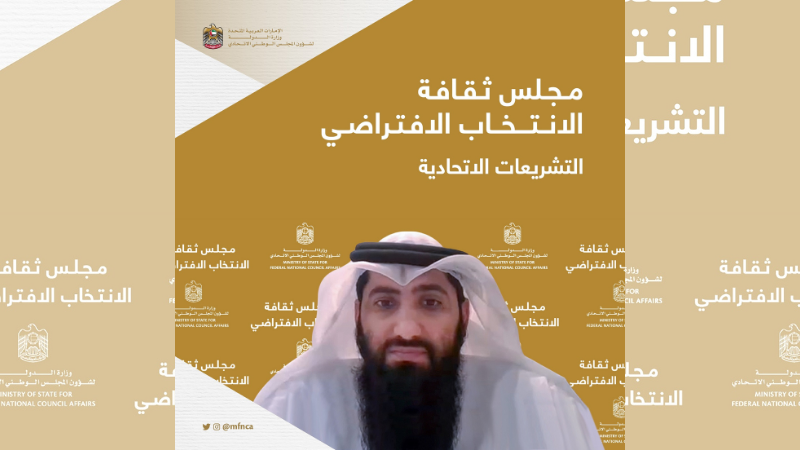Highlights
Ministry of State for FNC Affairs Hosts Interactive Meeting on Federal Legislations, Cycles, and Legislative Procedures

The Ministry of State for Federal National Council Affairs (MFNCA) hosted the fifth interactive meeting of its ‘Electoral Culture Virtual Majlis’ initiative, where federal legislations expert Dr Ahmed Mohammed Abdullah Al Shehhi presented and discussed the various categories of federal legislations, legislative cycles, and the procedures for drafting legislations.
“To legislate is to set written legal rules by a competent public authority, in accordance with the Constitution and the rules therein. It is the primary and official source of laws,” Dr Al Shehhi explained, citing the advantages of the legislation process, such as the ease of setting, amending, repealing, and referring to laws at any given time. “Laws are consistent, uniform, and clear; they serve to unify and standardise the legal system in the UAE, ensuring stability in transactions and promoting confidence among the people,” he added.
Al Shehhi revealed that the UAE had special types of legislative procedures, describing federal laws as the most important legislative tool that the legislative authority uses to implement the provisions of the Federal Constitution, regulate matters of strategic importance for the UAE, streamline the country’s relations with its institutions and with individuals, and govern relationships of individuals with each other.
Dr Al Shehhi went on to discuss federal decree-laws, saying: “Federal decree-laws become necessary when there is cause to issue a federal law while the Federal Supreme Council is not convened, which is typically a requirement for issuing federal laws. Federal decree-laws are then raised to the Federal Supreme Council within a week of it convening to review and decide to ratify or repeal it.”
“A federal decree, meanwhile, is a legislative tool that allows His Highness the President of the UAE to fulfil the tasks that are under his authority as per the Constitution,” he continued. “There are two types of decrees: regular decrees and decrees by delegation, the latter of which are delegated by the Federal Supreme Council to H.H. the President to be issued.”
The fourth legislative tool, Dr Al Shehhi added, are Cabinet decisions, which enable the Council of Ministers to carry out its duties as the executive body of the Union. The most notable types of legislation the Council issues are executive regulations, regulations to classify public departments and facilities, traffic regulations, and regulations to ensure public health and inspect food items.The session finally presented a fifth legislative tool: ministerial decisions and circulars, which are issued by individual Ministers to regulate operations and procedures in certain sectors.
Dr Al Shehhi then moved on to explaining the three main stages for drafting federal laws, beginning with the preparation stage, to the drafting stage, and finally, issuing the legislation.
“It is important to verify the subject of the legislation and the importance of issuing it at the preparation stage,” he said. “At this point, a committee of experts, specialists, and lawmakers is formed to outline the issues that the entity in question is looking to address, in collaboration with local government entities, particularly when it comes to legislative matters falling under the jurisdiction of the Federal Government. The first condition, however, is to obtain the Cabinet’s formal approval for preparing a legislation.”
Stage two – drafting the legislation – is the responsibility of the Technical Committee for Legislations. It includes verifying if the proposed legislation can indeed fulfil the UAE’s vision; examining the issue and determining the objectives of the legislation, as well as the means to implement it and achieve those goals; and identifying the legislation’s scope of impact.
The third and final stage calls for raising the legislation to the Council of Ministers to approve it and forward it to the Federal National Council for discussion. The draft legislation is then sent back to the Cabinet, who, in turn, raises it to the Federal Supreme Council to formally issue it.
Dr Al Shehhi went on to outline the final form of a federal law, which includes the following elements: title and preamble, index of articles in order, definitions, scope of application of the legislation, general provisions, substantive provisions, penalties in case of violations, and final provisions, as well as the name of the entity issuing the legislation, its capacity, place, and date of issuance.
The Ministry of State for Federal National Council Affairs continues to organise its series of lectures, which seek to raise awareness and establish a culture of political participation among all members of the community, in addition to introducing them to parliamentary processes in the UAE. The schedule of events and speakers is set to be announced through the Ministry’s official social media accounts on Instagram (mfnca) and Twitter (@mfnca).
-

 Banking & Finance2 months ago
Banking & Finance2 months agoOman Oil Marketing Company Concludes Its Annual Health, Safety, Environment, and Quality Week, Reaffirming People and Safety as a Top Priority
-

 News2 months ago
News2 months agoJamal Ahmed Al Harthy Honoured as ‘Pioneer in Youth Empowerment through Education and Sport’ at CSR Summit & Awards 2025
-

 OER Magazines2 months ago
OER Magazines2 months agoOER, December 2025
-

 News2 months ago
News2 months agoAI Security Conference 2025 Hosted by Securado Highlights the Changing Cybersecurity Landscape
-

 Insurance1 month ago
Insurance1 month agoSupporting Community Wellness: Liva Insurance Sponsors Muscat Marathon 2026 with Free Health Checkups
-

 Interviews1 month ago
Interviews1 month agoEXCLUSIVE INTERVIEW: TLS Rebranding Marks Strategic Leap Toward Innovation, Sustainability & Growth
-

 Insurance4 weeks ago
Insurance4 weeks agoLiva Insurance Supports Community Wellness Through “Experience Oman – Muscat Marathon 2026”
-

 Investment2 weeks ago
Investment2 weeks agoLalan Inaugurates Its First Overseas Manufacturing Facility, Marking Sri Lanka’s First Investment in SOHAR Freezone





























